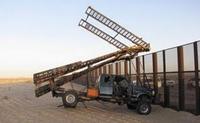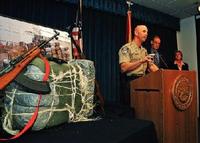-
Sector Report for Thursday, 5 May 2011: Border / Immigration control
This report contains the following stories.
-
-
Texas lawmakers fight for more drones
Texas lawmakers are pushing federal officials to deploy more unmanned aerial vehicles (UAVs) along the state’s southern border with Mexico; currently one Predator drone patrols the skies above Texas’ border and the Gulf Coast, while three Predators operate out of Arizona and one in North Dakota; Representative Henry Cuellar (D-Texas) and two other congressman from Texas recently met with state and federal officials to lobby for the additional deployment of drones
-
-
Civil rights groups seek to block Utah's immigration law
On Tuesday, two civil rights and immigration advocacy groups filed lawsuits against Utah in an attempt to stop a tough Arizona-style law from taking effect; Utah’s immigration law is scheduled to take hold on 10 May and comes after legislators made many compromises to draft a bill that they thought would avoid legal challenges; the American Civil Liberties and Union (ACLU) and the National Immigration Law Center brought forth a class-action lawsuit against the law on the grounds that it interferes with the federal government’s responsibility to enforce immigration; Utah’s attorney general is determined to defend the law
-
-
DHS allocates $25.5M for border communications
DHS recently announced that it would spend $25.5 million on additional security measures along the border; the money will be allocated to states as part of the Border Interoperability Demonstration Project (BIDP) which is designed as a one-time competitive grant program to develop innovative solutions that improve emergency communications for first responders and law enforcement agents; seven states including California, Maine, and Texas will receive grants
-
-
Lawmakers call for designation Mexican drug cartels as terrorist
Several lawmakers called on Secretary of State Hillary Clinton to support labeling Mexican drug cartels as terrorist groups and craft a strategy to help Mexico defeat them; the lawmakers behind the letter warned that escalating violence perpetrated by the cartels in Mexico “threatens the very foundation of that nation” and threatens to turn into “a lawless haven”
-
-
DHS offers grants for interoperable border communication
DHS announced $25.5 million in grant funding under the Border Interoperability Demonstration Project (BIDP) — a one-time competitive grant program focused on developing solutions to strengthen interoperable emergency communications along the U.S. borders with Canada and Mexico
-
-
Secure Communities: facts and figures
Secure Communities is a program of DHS’s Immigration and Customs Enforcement (ICE) division under which local police agencies submit to the FBI the fingerprints of all suspects they detain. The FBI sends the fingerprints to immigration officials to see whether the detainees have also violated immigration laws; between October 2008 and 31 March 2011, local communities sent 7,225,393 fingerprints to the FBI
-
-
Large portion of firearms in Mexico's violence come from the U.S. government

In February 2009 President Obama said that “More than 90 percent of the guns recovered in Mexico come from the United States, many from gun shops that line our border”; the president was right that most of the weapons used in the war among the cartels — and between the cartels and the Mexican government — come from the United States, but it now appears that they do not come from gun shows or mom and pop gun stores; rather, these weapons — many of them not even sold in guns stores — come from the U.S. government; the United States sells hundreds of millions of dollars worth of firearms to the Mexican government and the countries in Central America; corrupt officials in these countries prefer to sell these weapons to the Mexican cartels for a tidy profit rather than keep these weapons in their own armories and reserves
-
-
Sector Report for Thursday, 21 April 2011: Border / Immigration control
This report contains the following stories.
-
-
Officials struggle to define border security
Despite not having a clearly defined conception of what security along the border should look like, the government has spent billions of dollars each year causing some to begin wondering what metrics can be used to define success for these various programs; as Congress battles to find cost savings and cut ineffective programs, it will become increasingly critical to have clear assessments of the efficacy of large expenditures like border security programs; Border Patrol is expected to begin trials with new metrics in October of this year and GAO indicates that these new metrics will help Border Patrol become more cost effective
-
-
Atlanta opposes tough immigration law fearing financial backlash
The Atlanta City Council is attempting to persuade Georgia governor Nathan Deal from signing a tough Arizona-style immigration law that was recently passed; the council’s opposition to the bill is largely based on financial reasons as it fears losing millions of dollars in revenue from its tourism and convention business if organizations boycott Georgia as a result of the law; similar financial reasons recently motivated the Arizona business community to mobilize against several controversial immigration bills; it is estimated that the backlash against the recent Arizona immigration law resulted in more than $200 million in lost revenues to businesses
-
-
Arizona sheriff accuses Border Patrol of suppressing arrest figures
A sheriff in Arizona has accused U.S. Border Patrol officials of instructing local law enforcement officers to stop arresting immigrants illegally entering the United States along its southern border; the sheriff says he had been instructed by federal officials to not arrest immigrants crossing illegally because they wanted to reduce figures for the number of apprehensions at the border; DHS Secretary Napolitano recently cited a reduction of apprehensions along the border as evidence that the border was more secure than ever; U.S. Border Patrol officials staunchly denied these claims
-
-
Space technology of practical uses on Earth

Terahertz technology developed for space missions to study the most distant objects in the universe is now finding a host of practical applications back on Earth; most clothing and packaging materials are transparent to Terahertz radiation, whereas skin, water, metal and a host of other interesting materials are not; this gives rise to some important day-to-day applications: detecting weapons concealed under clothing or inside parcels; distinguishing skin and breast cancer tissue; quality control of manufactures items and processes in factories
-
-
Smugglers use portable ramp to jump border fence

Drug smugglers along the U.S.-Mexico border are relying on increasingly more innovative ways to bypass additional security measures deployed along the southern border; law enforcement officials recently discovered a mobile folding ramp that allowed vehicles to drive over the border fence; the portable ramp was found in the Barry M. Goldwater Range east of Yuma, Arizona as Border Patrol agents chased a vehicle that had just used the ramp to leap over the fence with 1,000 pounds of marijuana
-
-
Pinal County U.S. No. 1 pass-through county for drugs, human smuggling

Sheriff Paul Babeu of Pinal County, Arizona says his county was the number one pass through county in the nation for drug and human smuggling; the amount of marijuana seized in Pinal County has increased from 19,619 pounds in 2008 to more than 45,000 pounds seized last year; “We need help out in Arizona. On anybody’s scorecard, if the majority of people [illegal immigrants] are getting through, that is a failing grade. Period,” Sheriff Paul Babeu the sheriff called for implementing in Pinal County the system now in place in the Yuma sector, where 96 percent of those attempting to cross illegally are captured
-
- All
- Regional
- Water
- Biometrics
- Borders/Immig
- Business
- Cybersecurity
- Detection
- Disasters
- Government
- Infrastructure
- International
- Public health
- Public Safety
- Communication interoperabillity
- Emergency services
- Emergency medical services
- Fire
- First response
- IEDs
- Law Enforcement
- Law Enforcement Technology
- Military technology
- Nonlethal weapons
- Nuclear weapons
- Personal protection equipment
- Police
- Notification /alert systems
- Situational awareness
- Weapons systems
- Sci-Tech
- Sector Reports
- Surveillance
- Transportation
Advertising & Marketing: advertise@newswirepubs.com
Editorial: editor@newswirepubs.com
General: info@newswirepubs.com
2010-2011 © News Wire Publications, LLC News Wire Publications, LLC
220 Old Country Road | Suite 200 | Mineola | New York | 11501
Permissions and Policies
Editorial: editor@newswirepubs.com
General: info@newswirepubs.com
2010-2011 © News Wire Publications, LLC News Wire Publications, LLC
220 Old Country Road | Suite 200 | Mineola | New York | 11501
Permissions and Policies
